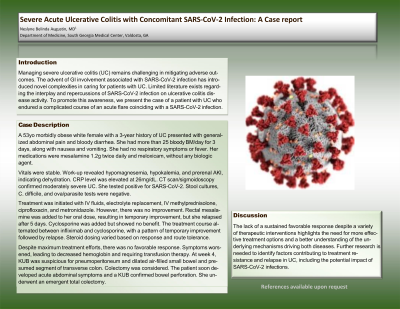Sunday Poster Session
Category: IBD
P0804 - Severe Acute Ulcerative Colitis with Concomitant SARS-CoV-2 Infection: A Case Report
Sunday, October 22, 2023
3:30 PM - 7:00 PM PT
Location: Exhibit Hall

Has Audio
.jpg)
Neslyne B. Augustin, MD
South Georgia Medical Center
Valdosta, GA
Presenting Author(s)
Neslyne B. Augustin, MD
South Georgia Medical Center, Valdosta, GA
Introduction: Managing severe ulcerative colitis (UC) remains challenging in mitigating adverse outcomes. The advent of GI involvement associated with SARS-CoV-2 infection has introduced novel complexities in caring for patients with UC. Limited literature exists regarding the interplay and repercussions of SARS-CoV-2 infection on ulcerative colitis disease activity. To promote this awareness, we present the case of a patient with UC who endured a complicated course of an acute flare coinciding with a SARS-CoV-2 infection.
Case Description/Methods: A 53yo morbidly obese white female with a 3-year history of UC presented with generalized abdominal pain and bloody diarrhea. She had more than 25 BM/day for 3 days, along with nausea and vomiting. She had no respiratory symptoms or fever. Her medications were mesalamine 1.2g twice daily and meloxicam, without any biologic agents.
Vitals were stable. Work-up revealed hypomagnesemia, hypokalemia, and prerenal AKI, indicating dehydration. CRP level was elevated at 26mg/dL. CT scan/sigmoidoscopy confirmed moderately severe UC. She tested positive for SARS-CoV-2. Stool cultures, C. difficile, and ova/parasite tests were negative.
Treatment was initiated with IV fluids, electrolyte replacement, IV methylprednisolone, ciprofloxacin, and metronidazole. However, there was no improvement. Rectal mesalamine was added to her oral dose, resulting in temporary improvement, but she relapsed after 5 days. Cyclosporine was added but showed no benefit. The treatment course alternated between infliximab and cyclosporine, with a pattern of temporary improvement followed by relapse. Steroid dosing varied based on response and route tolerance.
Despite maximum treatment efforts, there was no favorable response. Symptoms worsened, leading to decreased hemoglobin and requiring transfusion therapy. At week 4, KUB was suspicious for pneumoperitoneum and dilated air-filled small bowel and presumed segment of transverse colon. Colectomy was considered. The patient soon developed acute abdominal symptoms and a KUB confirmed bowel perforation. She underwent an emergent total colectomy.
Discussion: The lack of a sustained favorable response despite a variety of therapeutic interventions highlights the need for more effective treatment options and a better understanding of the underlying mechanisms driving both diseases. Further research is needed to identify factors contributing to treatment resistance and relapse in UC, including the potential impact of SARS-CoV-2 infections.
Disclosures:
Neslyne B. Augustin, MD. P0804 - Severe Acute Ulcerative Colitis with Concomitant SARS-CoV-2 Infection: A Case Report, ACG 2023 Annual Scientific Meeting Abstracts. Vancouver, BC, Canada: American College of Gastroenterology.
South Georgia Medical Center, Valdosta, GA
Introduction: Managing severe ulcerative colitis (UC) remains challenging in mitigating adverse outcomes. The advent of GI involvement associated with SARS-CoV-2 infection has introduced novel complexities in caring for patients with UC. Limited literature exists regarding the interplay and repercussions of SARS-CoV-2 infection on ulcerative colitis disease activity. To promote this awareness, we present the case of a patient with UC who endured a complicated course of an acute flare coinciding with a SARS-CoV-2 infection.
Case Description/Methods: A 53yo morbidly obese white female with a 3-year history of UC presented with generalized abdominal pain and bloody diarrhea. She had more than 25 BM/day for 3 days, along with nausea and vomiting. She had no respiratory symptoms or fever. Her medications were mesalamine 1.2g twice daily and meloxicam, without any biologic agents.
Vitals were stable. Work-up revealed hypomagnesemia, hypokalemia, and prerenal AKI, indicating dehydration. CRP level was elevated at 26mg/dL. CT scan/sigmoidoscopy confirmed moderately severe UC. She tested positive for SARS-CoV-2. Stool cultures, C. difficile, and ova/parasite tests were negative.
Treatment was initiated with IV fluids, electrolyte replacement, IV methylprednisolone, ciprofloxacin, and metronidazole. However, there was no improvement. Rectal mesalamine was added to her oral dose, resulting in temporary improvement, but she relapsed after 5 days. Cyclosporine was added but showed no benefit. The treatment course alternated between infliximab and cyclosporine, with a pattern of temporary improvement followed by relapse. Steroid dosing varied based on response and route tolerance.
Despite maximum treatment efforts, there was no favorable response. Symptoms worsened, leading to decreased hemoglobin and requiring transfusion therapy. At week 4, KUB was suspicious for pneumoperitoneum and dilated air-filled small bowel and presumed segment of transverse colon. Colectomy was considered. The patient soon developed acute abdominal symptoms and a KUB confirmed bowel perforation. She underwent an emergent total colectomy.
Discussion: The lack of a sustained favorable response despite a variety of therapeutic interventions highlights the need for more effective treatment options and a better understanding of the underlying mechanisms driving both diseases. Further research is needed to identify factors contributing to treatment resistance and relapse in UC, including the potential impact of SARS-CoV-2 infections.
Disclosures:
Neslyne Augustin indicated no relevant financial relationships.
Neslyne B. Augustin, MD. P0804 - Severe Acute Ulcerative Colitis with Concomitant SARS-CoV-2 Infection: A Case Report, ACG 2023 Annual Scientific Meeting Abstracts. Vancouver, BC, Canada: American College of Gastroenterology.
